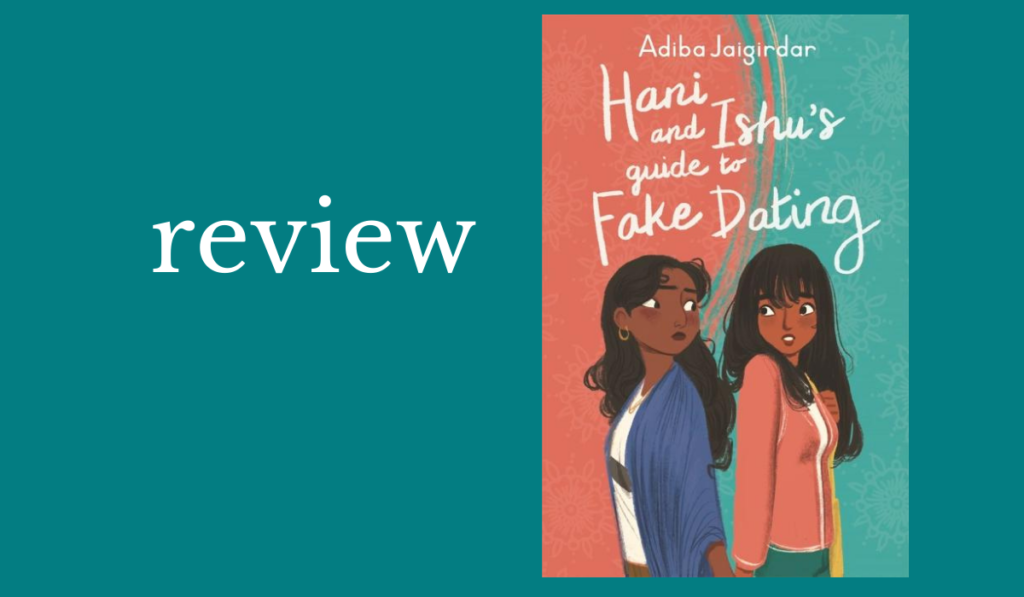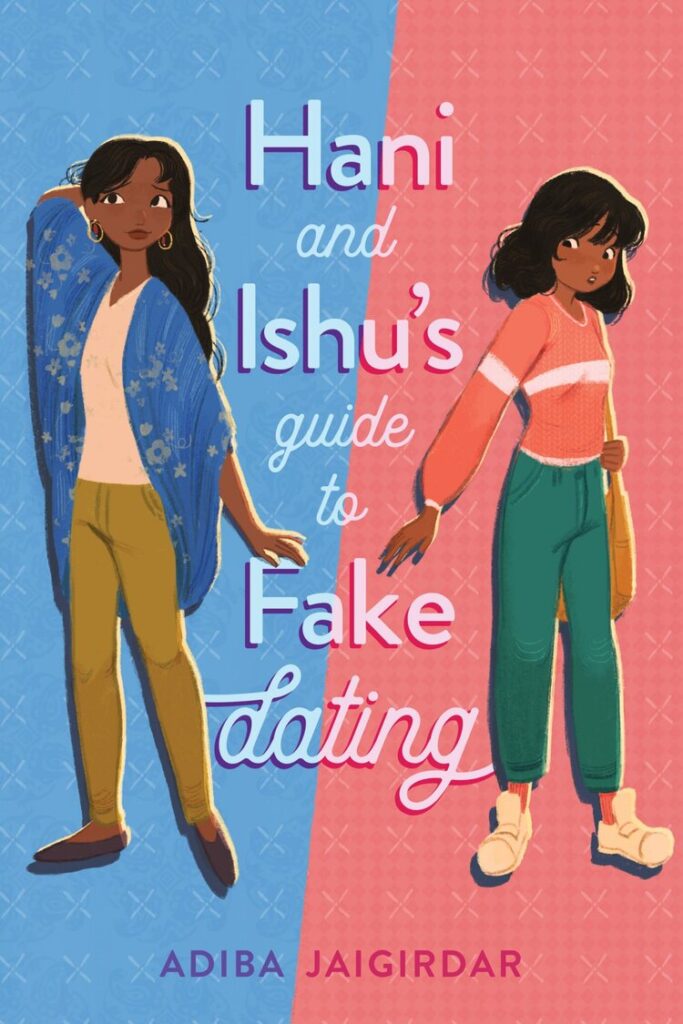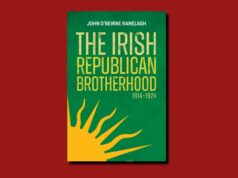
Hani and Ishu’s Guide to Fake Dating|Adiba Jaigirdar|Hachette|ISBN 9781444962253|€9.99|Cover design by Nabi Haider Ali
by Catherine Murphy
Hani and Ishu’s Guide To Fake Dating is the new YA queer romance from Adiba Jaigirdar and it’s everything it promises.
The story follows two young women as they pretend to be dating one another: Hani because she wants her friends to believe that she is bisexual; Ishu because she needs Hani’s popularity to help her gain votes if she is to become head girl.
At first, all runs smoothly. They go on a fake date, they take fake couple-pictures to post on Instagram; everything seems to be going to plan. But the heart cannot be fooled and will make fools of those who try; before long, both young women find themselves developing very real feelings for the other.
Hani and Ishu takes me back to a time in my teens when even holding hands is a Really Big Deal. Hani is an instantly likable character, sweet and funny and caring. I found Ishu less pleasant at first as she showed her spiky edges, then I gradually came to really care about her, finding her home life incredibly sad without the truth and support shown in Hani’s family.
Hani and Ishu takes me back to a time in my teens when even holding hands is a Really Big Deal.
Ishu’s empty bedroom exaggerated the loneliness and isolation in her life, and Hani’s easy conversations with her parents were strong and comfortable in comparison. Both families are clearly very different and whilst the difficult, strained relationship between Ishu and her sister, Nik, didn’t make sense to me at first, as the plot developed I very much enjoyed the connection between them.
Hani and Ishu is a rich and very lovable story. We live in a diverse society and it’s a sheer joy to find more and more books representing the truth of Irish diversity.
Hani and Ishu’s Guide To Fake Dating is, above all, cute: cute and queer, cute and Muslim, cute and not-Muslim, cute and Bengali, cute and Irish – Adiba Jaigirdar takes all these things and wraps them in cute, and I’m so here for this.
The book is steeped wonderfully in Bengali life—language, food, family, names, holidays, lifestyle. At first I found each young woman having a number of different names a bit confusing but the Irish Bengali household feels wonderfully authentic and from what my friend tells me, having multiple names is part of that. She laughs when I say I’m confused and tells me how all her aunts have the names they are given, then the names everyone uses, then their nicknames, then fond names. I loved the cultural differences in this book, reading about the different ways to celebrate things. Hani and Ishu is a rich and very lovable story. We live in a diverse society and it’s a sheer joy to find more and more books representing the truth of Irish diversity.
The sadness here is in the story behind Nik’s wedding. Adiba Jaigirdar writes from her heart in the sorrow, and everything is felt deeply. As Nik stands up for Ishu it’s great to see the younger sister grow and thrive; there are other issues in the family that don’t resolve quite so easily–and poor Nik is left without family support from her parents and without inclusion, from her choices.
That said, the book is a romance, a tale with a happy ever after guaranteed, and at no point is the reader in a state of too much tension; we know that Hani and Ishu will end up together by the end of the book and the point here isn’t the resolution, it’s the journey, and it’s really rather lovely.
Hani and Ishu’s Guide To Fake Dating is, above all, cute: cute and queer, cute and Muslim, cute and not-Muslim, cute and Bengali, cute and Irish – Adiba Jaigirdar takes all these things and wraps them in cute, and I’m so here for this.
Hani and Ishu’s Guide To Fake Dating deals with many issues and I loved how faith was given importance here and how Ishu supported Hani unconditionally with regards to her faith, although she didn’t share her beliefs.
Earlier in the book Hani’s friends raise the question that if she’s not into dating guys right now and she is in a relationship with another woman, then she must be gay. I felt a ripple down my spine when Hani explains she doesn’t need to be with anyone to be bisexual. She simply is bisexual; that she might be with a guy or a girl isn’t the point, the point is acceptance for who she really is.

This is the very core of the story, from sexuality to faith, from diet choices to movie preferences—true friendship only comes with true acceptance. Hani tells her friends who she is and the fact that they can’t love and support her for her faith, sexuality and lifestyle simply means—spoiler alert—they’re rubbish friends. When people don’t treat you right, they don’t love you.
Hani and Ishu is a joyous, comfortable, cute and lovable book, and it should be on the shelves of every school library; I’d much rather have had this to read than Jane Austen. Finishing this, I felt as if I’d emerged from a time where everything is all right and where the world is a better place, like walking out of the cinema after watching a really happy movie, oblivious to the troubles of the world and the rain outside, and I’m just hugging the story to me for as long as I can.

Catherine Murphy @scribblingink1











